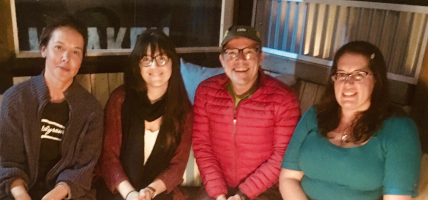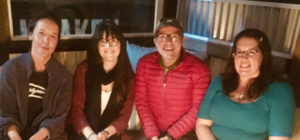Fire, Write the Docs, and Robots
From across the room, the glinting, glossy, rock gas fireplace drew me in. I joined several fellow technical writers for a lovely chat about Write the Docs and robots.
Write the Docs is a free online community with excellent information for writers, users, developers, and “everyone.” Their all encompassing motto: “We consider everyone who cares about communication and documentation and their users to be a member of our community.” They cover technical writing and many other types of writing too. Everyone at our meeting loved that they have conferences around the world including the US, Czech Republic, and Australia. They also have local meetup groups and a Slack community.
A few of our other favourite things about Write the Docs:
- Great podcasts.
- Style guides are accessible, succinct, and inclusive.
- Google developer docs are well thought out and intuitive. Developers.google.com/style.
- Great that developers and document control and creative writing are all included.
It was interesting to note that the only Canadian section of Write the Docs is in Toronto.
We discussed the possibility of chatbots replacing our jobs as technical writers. Most attendees were not too worried about it, and one person had some great quotes on this subject. “Technical writers are not a knife. We are the ones who sharpen the knife.” “An itch in wording or communication to prove your worth, but you still need a professional to scratch that itch.” STC TechComm Today linked to this blog, and it agreed with us that robots will likely not take over a technical writer’s job anytime soon.
However, we discussed the idea that sometimes there could be no need for documents because of improved cognitive design. We also discussed technical writers needing to brush up on new skills to adapt to the changing industry. For example, creating videos or learning API skills.
Next, we talked about how to measure the quality of documentation. This ranged from getting feedback from users through product surveys, to peer editing, to how to deal with users who don’t read the manual (this is a tough one). We thought that video instructions are the way of the future, but some of us still like to read steps and don’t want to watch a long video. Analytics can also tell you how your knowledge base is being used and this might be even more effective than trying to get users to take a survey.
This conversation led us to agonise over the dangers of editing an article too soon. One writer was having trouble editing before being finished a piece. Another writer suggested letting the manual steep for a few days before editing it (although, time is not always a luxury a writer can afford). Sometimes writers can get caught up on one word and this can derail us.
Before we knew it, our two hours were up. Mesmerised by the cozy fire, we didn’t want to tear ourselves away. However, the Breakwater Tasting Room was closing, so we told our server that she would have to turn off our fire if she wanted us to depart. She obliged.
The Tech Comm Café provides networking opportunities, job leads, answers to work-related dilemmas, and a burst of professional energy to keep you motivated. We welcome anyone who’s interested in technical communication — contractor, in-house, student, long-time tech writer, STC member, non-member, career-changer, or recruiter. We hope to see you there!
Next Meetings


